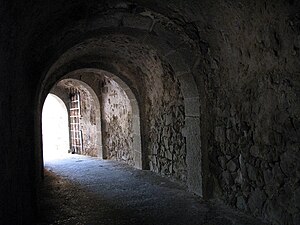Ottoman–Venetian War (1714–18)
| Seventh Ottoman–Venetian War | |||||||||
|---|---|---|---|---|---|---|---|---|---|
| Part of the Ottoman–Venetian Wars | |||||||||
 Dante’s Gate in Spinalonga fort, the last remaining Venetian outpost on Crete |
|||||||||
|
|||||||||
| Belligerents | |||||||||
|
Hajduks |
|
||||||||
| Commanders and leaders | |||||||||
|
|
|
||||||||
The Seventh Ottoman–Venetian War was fought between the Republic of Venice and the Ottoman Empire between 1714 and 1718. It was the last conflict between the two powers, and ended with an Ottoman victory and the loss of Venice's major possession in the Greek peninsula, the Peloponnese (Morea). Venice was saved from a greater defeat by the intervention of Austria in 1716. The Austrian victories led to the signing of the Treaty of Passarowitz in 1718, which ended the war.
This war was also called the Second Morean War, the Small War or, in Croatia, the War of Sinj.
Following the Ottoman Empire's defeat in the Second Siege of Vienna in 1683, the Holy League of Linz gathered most European states (except for France, England and the Netherlands) in a common front against the Ottomans. In the resulting Great Turkish War (1684–1699) the Ottoman Empire suffered a number of defeats such as the battles of Mohács and Zenta, and in the Treaty of Karlowitz (1699), was forced to cede the bulk of Hungary to the Habsburg Monarchy, Podolia to Poland-Lithuania, while Azov was taken by the Russian Empire.
Further south, the Republic of Venice had launched its own attack on the Ottoman Empire, seeking revenge for successive conquests of its overseas empire by the Turks, most recently (1669) the loss of Crete. Venetian troops, under the command of the able general Francesco Morosini (who became Doge of Venice in 1688), were able early in the conflict to seize the island of Cephalonia (Santa Maura) in 1684, the Peloponnese (Morea) peninsula (1685–1687) and parts of Continental Greece, although attempts to conquer Chalkis (Negroponte), recover Crete and hold on to Chios failed. In the Treaty of Karlowitz, Venice gained recognition of its control over Cephalonia and the Morea, and restored the situation in the Aegean to its pre-war status quo, leaving only the island of Tinos in Venetian hands.
...
Wikipedia
